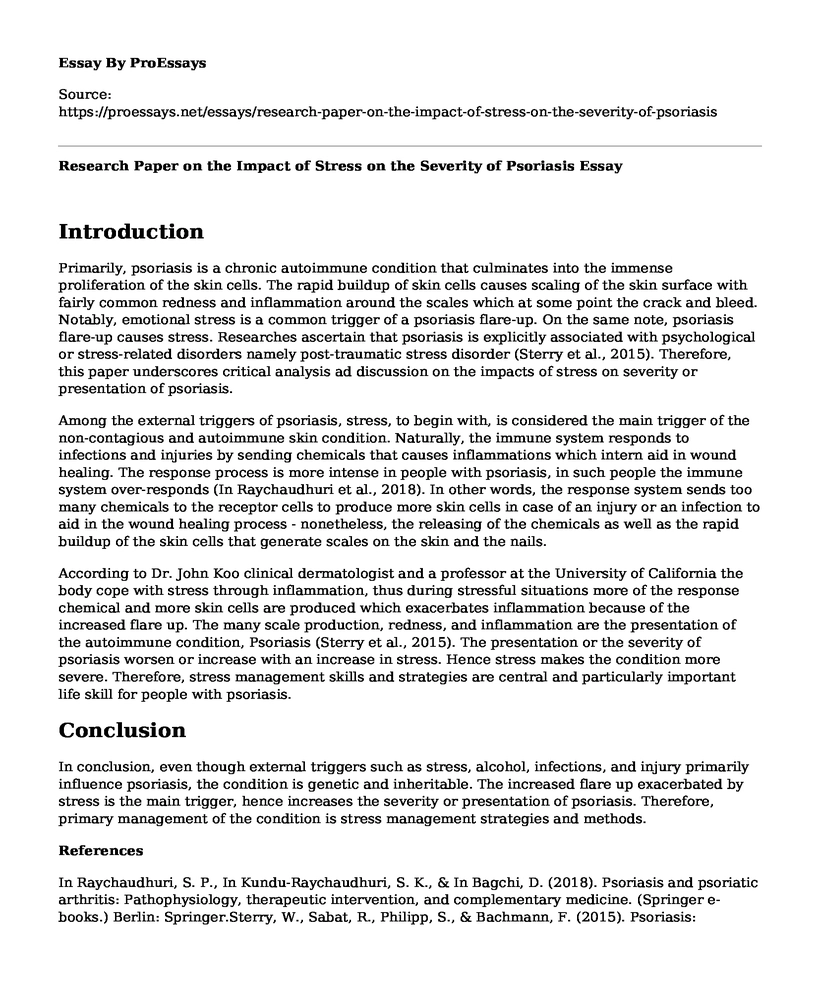Introduction
Primarily, psoriasis is a chronic autoimmune condition that culminates into the immense proliferation of the skin cells. The rapid buildup of skin cells causes scaling of the skin surface with fairly common redness and inflammation around the scales which at some point the crack and bleed. Notably, emotional stress is a common trigger of a psoriasis flare-up. On the same note, psoriasis flare-up causes stress. Researches ascertain that psoriasis is explicitly associated with psychological or stress-related disorders namely post-traumatic stress disorder (Sterry et al., 2015). Therefore, this paper underscores critical analysis ad discussion on the impacts of stress on severity or presentation of psoriasis.
Among the external triggers of psoriasis, stress, to begin with, is considered the main trigger of the non-contagious and autoimmune skin condition. Naturally, the immune system responds to infections and injuries by sending chemicals that causes inflammations which intern aid in wound healing. The response process is more intense in people with psoriasis, in such people the immune system over-responds (In Raychaudhuri et al., 2018). In other words, the response system sends too many chemicals to the receptor cells to produce more skin cells in case of an injury or an infection to aid in the wound healing process - nonetheless, the releasing of the chemicals as well as the rapid buildup of the skin cells that generate scales on the skin and the nails.
According to Dr. John Koo clinical dermatologist and a professor at the University of California the body cope with stress through inflammation, thus during stressful situations more of the response chemical and more skin cells are produced which exacerbates inflammation because of the increased flare up. The many scale production, redness, and inflammation are the presentation of the autoimmune condition, Psoriasis (Sterry et al., 2015). The presentation or the severity of psoriasis worsen or increase with an increase in stress. Hence stress makes the condition more severe. Therefore, stress management skills and strategies are central and particularly important life skill for people with psoriasis.
Conclusion
In conclusion, even though external triggers such as stress, alcohol, infections, and injury primarily influence psoriasis, the condition is genetic and inheritable. The increased flare up exacerbated by stress is the main trigger, hence increases the severity or presentation of psoriasis. Therefore, primary management of the condition is stress management strategies and methods.
References
In Raychaudhuri, S. P., In Kundu-Raychaudhuri, S. K., & In Bagchi, D. (2018). Psoriasis and psoriatic arthritis: Pathophysiology, therapeutic intervention, and complementary medicine. (Springer e-books.) Berlin: Springer.Sterry, W., Sabat, R., Philipp, S., & Bachmann, F. (2015). Psoriasis: Diagnosis and management. Chichester, England: Wiley Blackwell.
Cite this page
Research Paper on the Impact of Stress on the Severity of Psoriasis. (2022, Nov 02). Retrieved from https://proessays.net/essays/research-paper-on-the-impact-of-stress-on-the-severity-of-psoriasis
If you are the original author of this essay and no longer wish to have it published on the ProEssays website, please click below to request its removal:
- Information Hand-Out on Depression in Older Adults
- Research Paper on Culture and Personality
- Research Paper on Media Influences on Aggression
- Male Anorexia Paper Example
- Paper Sample on Mental Health Disasters: How Social Psychology Helps Understand Causes
- Personality Disorders: Anger, Unhappiness, Isolation - Essay Sample
- Essay on Mental Health Disorders in Kids and Adults: What You Need to Know







